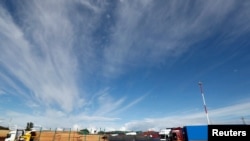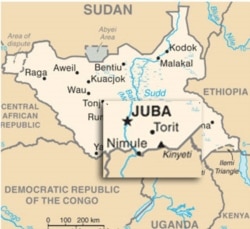South Sudanese are reeling from fuel shortages and soaring food prices after Kenyan and Ugandan truck drivers went on strike nearly two weeks ago, stifling commerce along the Uganda/South Sudan border.
Hundreds of motorists camped at the Trinity gas station in Juba for hours on Monday, waiting in long queues to fill up their tanks with diesel or gasoline.
"You hear people are busy, they want to get the fuel, they are struggling to get it at any cost," Juba motorist Steven Leju told VOA's South Sudan in Focus program.
The strike began when truckers halted their routes in response to the killings of two Kenyan truck drivers by assailants along the Juba-Nimule highway in August.
The drivers say they want South Sudan's government to improve security along the highway before they resume transporting goods into that country.
South Sudan's Ministry of Foreign Affairs said it is committed to providing security along the highway. The government said escorts will be provided by the South Sudan People's Defense Force and South Sudan Police Service and that "obstacles that cause [a] delay on the highway to Juba will be removed."
A frustrated motorist, who asked to be identified only as Leju, said the government had better act quickly. "I believe that if government gives security, then fuel will come," Leju said.
Rising fuel prices
Fuel prices rose to between 700 and 800 South Sudanese pounds (roughly $5.50) per liter Monday from 300 pounds (about $2.30) late last week.
Juba resident Justine Wota, one of hundreds of commuters who endured a long wait to get fuel, said prices are climbing by the hour.
After waiting since before dawn, "then you have to go to the fuel station and the price has changed," Wota told South Sudan in Focus.
Lack of food
Meanwhile, goods sold at markets are becoming scarce and prices are rising.
Rita William, a trader at Juba's Freedom Market, told South Sudan in Focus that the fresh vegetables she was expecting from Uganda are stuck at the Elegu border post.
She enlisted automobile transportation to bring carrots to Juba, which caused delays and additional costs.
"Most of our things are getting spoiled because things we loaded since Thursday, we have not received them," she said.
William Muhereza, chairperson of Freedom Market, called on South Sudanese nationals to engage in small scale farming to cushion their livelihoods against emergencies like the strike.
The government should be better prepared to deal more quickly with disruptions, he said.
"We expect the road to be maximum secured as far as security is concerned," he said. "That is the only road which feeds South Sudan. Without that road, South Sudan cannot exist. If that road is cut off, automatically there will be no food, or fuel, or anything."





